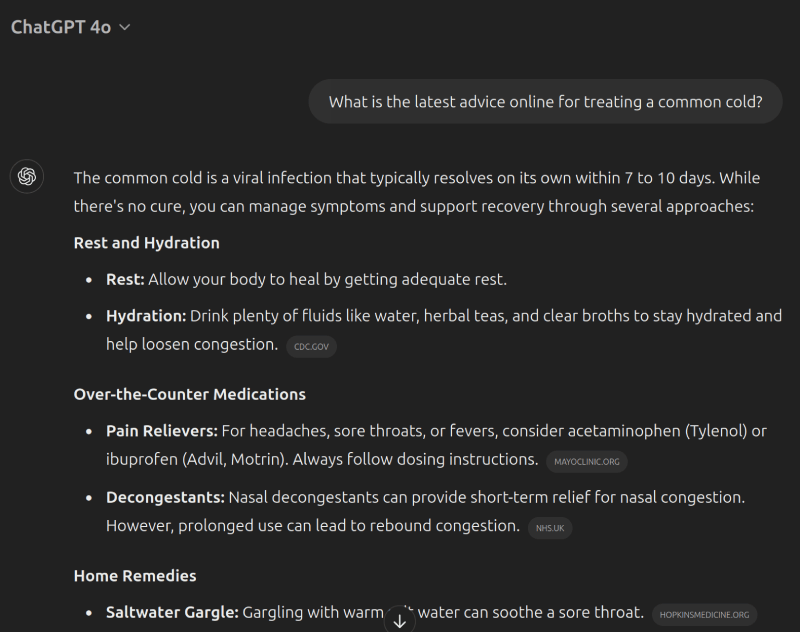The Role of Pharma Marketing in AI
The search engine has been the de facto method of online discovery since before the web was fully established. Archie helped us search FTP, and Veronica spidered through Gopher to pave the way for 1994’s first full-text web search, WebCrawler. It wasn’t until the late nineties when the algorithmic searches of AltaVista, Lycos, and Excite really popularized their use over blogrolls and web directories. By the time Google came on the scene with PageRank their trajectory was set.
For over 20 years the model has persisted. Improve rankings, improve search, and further entrench yourself at the heart of the web experience. It is this central position in experience that drives the Google revenue engine. Advertisers pay Google to reach customers in search because that’s where the customers are. Marketing teams build their sites with structures and content decisions specifically geared toward search engines. We pay attention to how they rank us, what technical rules they’ve changed from era to era, and we react when they flag issues–not in our sites, but in how those sites are crawled.
The landscape of search is now shifting dramatically and in real time.
The advent of the consumer AI age is changing how we engage with the web. Some bring their questions directly to a large language model (LLM) like ChatGPT, avoiding the web search entirely. Natural language processing (NLP) and personalization of these chat experiences means the user can ask questions and then ask follow up questions with the same remembered context. They don’t need to format their queries to suit the engine. The model can adapt to them instead.
Others may still use a search engine like Google, but whereas the page list was once the goal, now there are AI summaries right at the top. Why scroll down and click when the information is right there?
These summaries, and the results we see from web-capable LLMs like ChatGPT, are generated content and curation being performed by the models. In the case of the search results summaries, these are very small, weak models, querying just the top results in the search and summarizing. They have very little to guide the model’s algorithmic reasoning and might present untrustworthy sources just as much as trustworthy ones. The larger models have some guidelines baked into them, not at the AI model level itself, but wrapping it. Querying for health information online will result in specific sites being searched, citing them.

This type of curation is fragile, though, and many searches can slip through the cracks if phrased in the wrong way. Just like simple search summaries, it is common to see information from sites like reddit make their way into your result data, often to comical (or dangerous) results.
Regardless of the specifics of the AI mechanism the experience for the end user has taken a dramatic shift. To stay relevant to the user’s web experience the engines are changing, and they’re leaving behind the page rankings, paid search, and SEO optimization rules. What this means for marketing will be the subject of many articles and experiments, and is likely to change as companies like Google scramble to ensure their revenue model can adjust.
What’s more important in the short term are the ethical considerations. In the healthcare sector we have a duty to provide accurate medical information. It’s baked into policy and regulation, but it’s also at the heart of the businesses themselves. With some notable exceptions the driving goal of pharma is to find new and novel treatments to improve the lives of people. Even for those entities in the business purely for profit maximization, lying about health is a long term losing strategy.
In marketing, our websites and ads must adhere to rigorous guidelines to ensure they are accurate and balanced. Companies have internal medical, regulatory, and legal teams with the mission of ensuring this compliance. The FDA watches the line, ready to issue warnings where companies overstep, or to enter into Corporate Integrity Agreements if they’re especially naughty.
And for these reasons many companies are scared to touch AI. There isn’t complete control over the output of the content. What if something is miscommunicated, or only a claim is presented without fair balance? What type of liability does that create? When will the FDA provide guidance?
In the meantime, misinformation proliferates. In the absence of scientifically accurate information published by a credible source, the vacuum of search will be filled with the loudest voices. That might be the CDC or Mayo Clinic if you’re lucky. It might be reddit if you aren’t.
Pharma has a duty to public health to engage in these channels. The more medically accurate information we can push into the world, the more likely these LLMs will train answers upon it. That could mean lives saved, injuries prevented, and a growing culture of misinformation brought back on track in some small way.
Marketing considerations aside–and there will be plenty of those as well–we cannot wait to engage in these spaces, whether through structured data, or content optimized for AI (bulleted lists, clear hierarchy, FAQs).
In summary, AI is making a big change in how search engines work, moving away from traditional keyword searches to smart systems that understand what users really mean, personalize results, and adapt to new ways of searching. This shift makes the web experience easier and more efficient, but it also comes with responsibilities. In areas like healthcare and pharmaceuticals, there is an ethical duty to ensure that AI and large language models receive accurate, trustworthy information, so users can make safe and informed decisions.